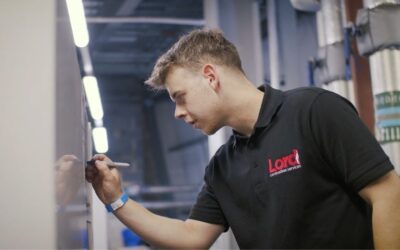As the UK accelerates its drive towards Net Zero, commercial and public sector organisations are facing mounting pressure to take meaningful action on sustainability.
With the government’s target to reach Net Zero carbon emissions by 2050, businesses are not only being scrutinised by regulators but also by customers, investors and supply chain partners who increasingly expect robust environmental credentials.
For many organisations, however, the path to Net Zero is as much about opportunity as it is about obligation. Energy efficiency measures – particularly those targeting heating, ventilation and air conditioning (HVAC) systems – are emerging as a critical focus.
As award-winning commercial heating and ventilation specialists, Lord Combustion Services are experts in the installation and maintenance of environmentally sustainable heating systems, and advise clients across diverse commercial sectors on improving efficiency.
Why heating and hot water are so important
HVAC systems are often the single largest source of energy consumption and carbon emissions in commercial and public buildings. In fact, government figures estimate that heating alone can account for up to 60 per cent of total energy consumption in non-domestic buildings.
Yet many commercial and public sector organisations across the UK are unknowingly wasting energy and money, while also increasing their carbon footprint, by relying on older boiler systems powered by gas or oil, and following poor energy management habits.
This issue is echoed by The Building Engineering Services Association (BESA), a leading industry body, which reported that thousands of commercial building owners in the UK are missing out on improving their energy efficiency by turning down thermostats and heating flow temperatures, and having their boilers serviced or upgraded.
The cost of outdated systems
Outdated heating systems are one of the most common issues we come across at Lord Combustion. Older boilers are far less efficient than modern models, meaning they burn more fuel to produce the same amount of heat.
This inefficiency leads to higher energy bills and more frequent breakdowns, which can disrupt business operations and result in costly repairs.
Poor maintenance is another factor that can quietly drain resources. When boilers, air conditioning units or ventilation systems aren’t serviced regularly, they become less efficient and use more energy to do the same job. Simple issues like blocked filters or vents can force systems to work harder, further increasing energy consumption and costs.
Leaving heating systems running while buildings are empty also contributes to carbon emissions. Without timers, sensors, or smart thermostats, heating and cooling systems may run when no one is present or maintain temperatures that are too high or too low for comfort or efficiency.
A clear environmental impact
This lack of control leads to wasted energy and higher bills, but most importantly, all these factors contribute to burning extra fuel, which releases more carbon dioxide into the atmosphere and contributes to climate change, making it harder for organisations to meet sustainability targets.
Public sector bodies, in particular, are under growing pressure to demonstrate leadership on climate action, with procurement increasingly favouring suppliers who can prove their green credentials.
Upgrading to modern, efficient HVAC technology and adopting smart controls can deliver immediate and long-term savings on energy bills for businesses, while also reducing maintenance costs. These improvements not only help organisations meet regulatory requirements but also step closer to becoming a Net Zero operation.
Recently, we helped our client Edgbaston Stadium move closer to this target by sourcing and installing an upgraded hot water system that has helped the venue to significantly reduce its reliance of fossil fuels.
Beyond these benefits, there’s a strong business case for acting now. As energy prices remain volatile and environmental regulations tighten, organisations that invest in sustainability are better positioned to manage risk and adapt to future changes
Leading the future of energy efficiency
The UK Government and local authorities are keen to help organisations make the switch. The Public Sector Decarbonisation Scheme has already provided over £2.5 billion to help schools, hospitals and councils upgrade their heating systems, with a strong focus on heat pumps and smart controls.
For private businesses, various grants, incentives and support schemes are available, such as the government backed Energy Technology List (ETL) scheme, which helps UK businesses to make greener energy choices, along with various national energy grant schemes and region-specific schemes such as the Business Energy Advice Service in the West Midlands.
The path to Net Zero is a journey, but focusing on heating and hot water is the most effective step any business can take. Upgrading your boiler system will not only cut your carbon emissions and energy bills, but also improve comfort and air quality for everyone who uses your building.
Lord Combustion are specialists in helping businesses and public sector organisations to work towards their Net Zero targets through improved HVAC efficiency.
In 2021, we were recognised for our achievements in reducing clients’ environmental impact by winning the sustainability trophy at the West Midlands Business Masters Awards, organised by The Business Desk.
The following year, we made the West Midlands Net Zero Business Pledge as it marked its 40th anniversary with a visit by former West Midlands Mayor, Andy Street.
Overseen by regional champion Sustainability West Midlands on behalf of the West Midlands Combined Authority, the pledge is undertaken by businesses as part of the drive to lead the green revolution and become a net zero carbon economy by 2041.
Talk to Lord Combustion Services today to start your Net Zero journey.




